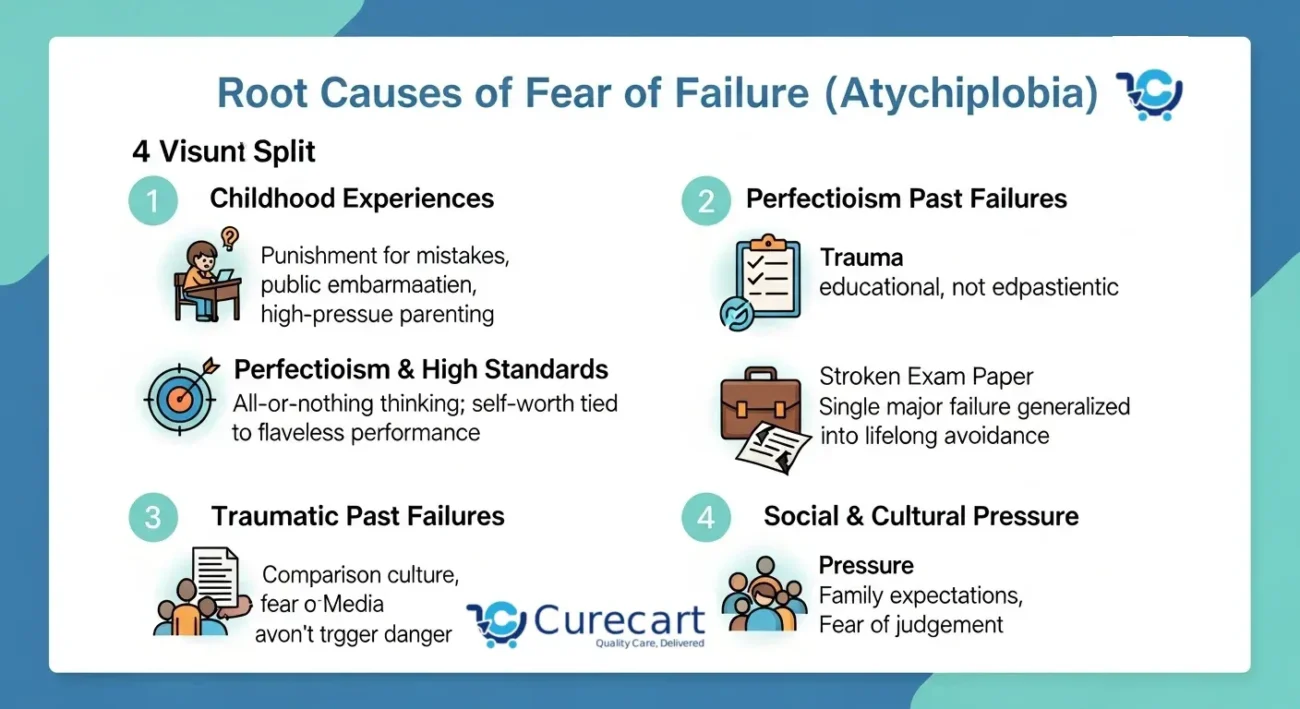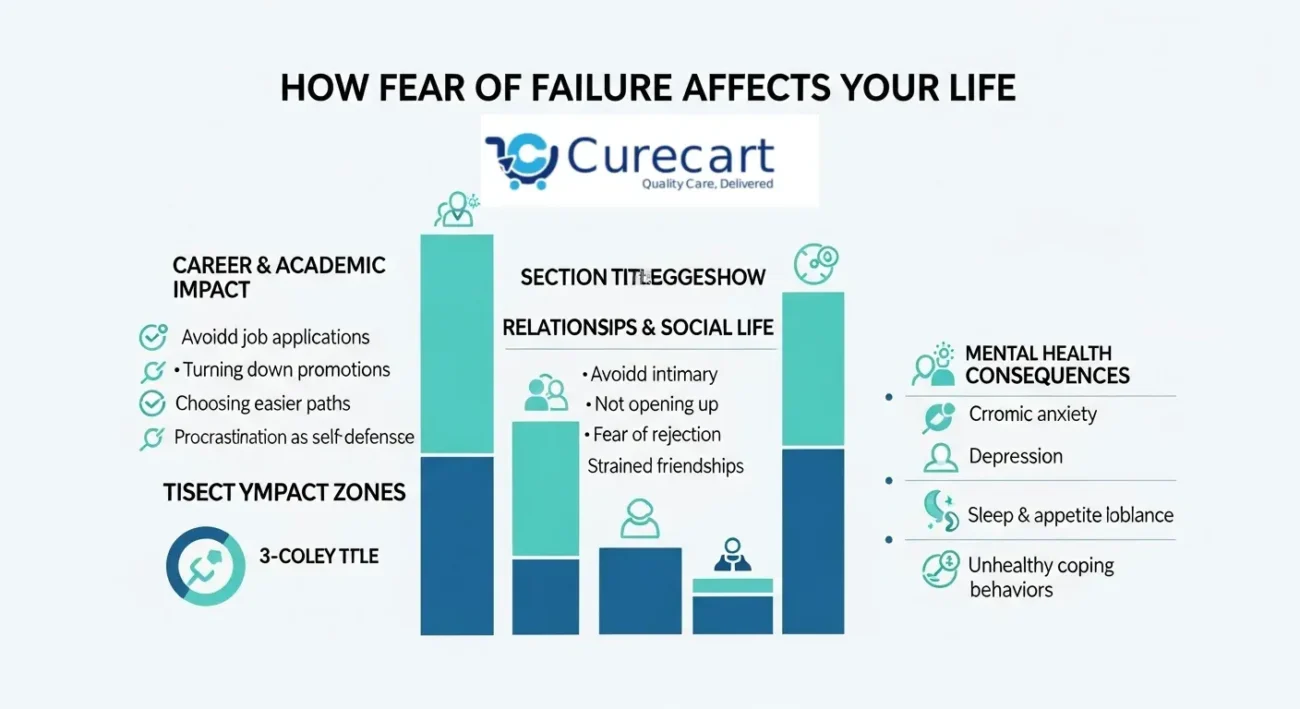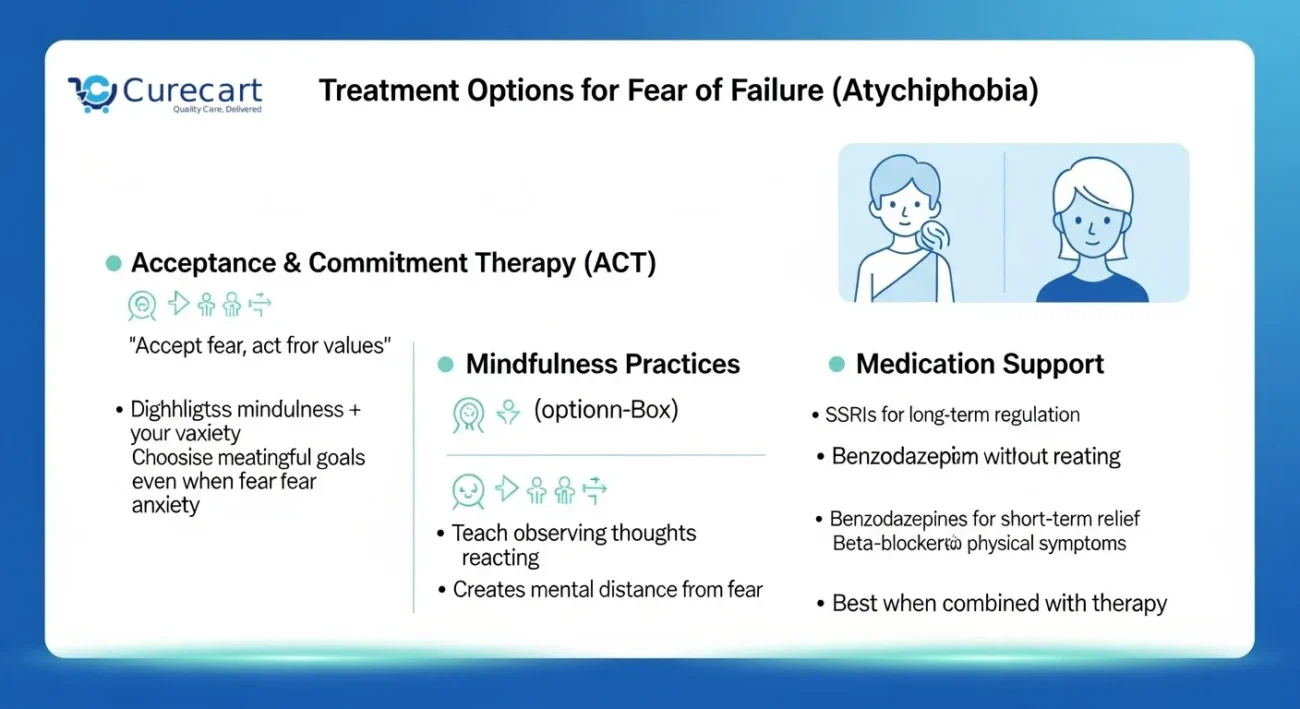Fear of failure is one of the most paralyzing emotions humans experience. It’s that knot in your stomach before a presentation, the voice telling you not to start that business, or the reason you’ve been putting off applying for your dream job. While occasional worry about outcomes is normal, atychiphobia the clinical term for extreme fear of failure can completely derail your life.
Atychiphobia keeps people stuck in jobs they hate, relationships that don’t serve them, and lives smaller than they deserve. Understanding where this fear comes from and how to treat it can be the difference between existing and actually living.
What Is Atychiphobia?
Atychiphobia comes from the Greek word “atyches,” meaning unfortunate or unlucky. It’s an irrational and persistent fear of failing that goes far beyond normal performance anxiety. While most people feel some apprehension before important events, those with atychiphobia experience debilitating anxiety that interferes with daily functioning.
The condition manifests differently in everyone. Some people avoid challenges entirely never applying for promotions, refusing to learn new skills, or staying in their comfort zones indefinitely. Others might start projects but abandon them at the first sign of difficulty. The common thread is a deep-seated belief that failure would be catastrophic.
Physical and Emotional Symptoms
When someone with atychiphobia faces a situation where they might fail, their body goes into fight-or-flight mode. Physical symptoms include rapid heartbeat, sweating, nausea, dizziness, shortness of breath, and trembling. Some people experience panic attacks complete with chest pain and a sense of impending doom.
The emotional symptoms are equally intense. Overwhelming anxiety and dread about potential failure dominate their thoughts. Many develop perfectionist tendencies, believing that anything less than flawless performance equals failure. This creates a vicious cycle the higher the standards, the more likely they feel they’ll fall short, which intensifies the fear.
Low self-esteem and negative self-talk become constant companions. Thoughts like “I’m not good enough” or “I’ll definitely mess this up” run on repeat. Some people become so paralyzed by these feelings that they experience complete avoidance of challenging situations, which only reinforces the fear over time.
Root Causes of Fear of Failure

Childhood Experiences
Many cases of atychiphobia trace back to childhood. Critical or demanding parents who emphasized achievement over effort can plant seeds of fear that grow for decades. Children who were punished for mistakes rather than encouraged to learn from them often develop the belief that failure is unacceptable.
Experiencing public embarrassment during formative years like being mocked for a wrong answer in class or failing in front of peers can create lasting associations between failure and humiliation. These early experiences shape how we view mistakes throughout our lives.
Perfectionism and High Standards
Perfectionism and fear of failure feed each other relentlessly. Perfectionists set impossibly high standards, then interpret anything below perfection as complete failure. This all-or-nothing thinking leaves no room for the reality that most success comes through trial and error.
The problem compounds when perfectionism is tied to self-worth. When your value as a person depends on flawless performance, any mistake feels like a personal catastrophe rather than a normal part of growth.
Traumatic Past Failures
Sometimes a single significant failure can trigger atychiphobia. Bombing a major exam, losing a job, experiencing a devastating business failure, or ending a relationship can all create trauma around failure. The brain then overgeneralizes if you failed catastrophically once, it must mean you’ll fail again in similar situations.
This is especially true when the failure had severe consequences or occurred during a vulnerable time. The emotional pain becomes associated with any risk of failure, making the brain hyper-vigilant about avoiding similar situations.
Social and Cultural Pressures
We live in a culture obsessed with success. Social media shows endless highlight reels of other people’s achievements while hiding their struggles and failures. This creates unrealistic expectations about what normal life looks like and amplifies the shame around not measuring up.
Cultural factors matter too. Some cultures place enormous emphasis on academic or career achievement, making failure feel like letting down not just yourself but your entire family or community. The weight of these expectations can be crushing.
How Atychiphobia Affects Your Life

Career and Academic Impact
Fear of failure can stall careers before they even start. People avoid applying for jobs they’re qualified for, convinced they’ll be rejected. They turn down promotions because the increased responsibility feels too risky. Students with atychiphobia might choose easier majors or avoid challenging courses, limiting their future options.
Procrastination becomes a defense mechanism. If you never really try, you can tell yourself you would have succeeded if you’d given full effort. This self-sabotage provides psychological protection but guarantees mediocre results.
Relationships and Social Life
Atychiphobia doesn’t just affect professional life it seeps into personal relationships too. Fear of rejection can prevent people from pursuing romantic interests or deepening friendships. Some avoid vulnerable conversations because emotional openness feels like risking failure in the relationship.
The constant anxiety and self-doubt can also strain existing relationships. Partners and friends might not understand why someone would turn down opportunities or seem stuck in patterns that clearly aren’t working.
Mental Health Consequences
Living with persistent fear of failure takes a serious toll on mental health. Chronic anxiety becomes the baseline. Many people with atychiphobia also develop depression, feeling hopeless about their ability to change or succeed.
The condition can trigger or worsen other anxiety disorders. The constant stress affects sleep, appetite, and physical health tips. Some people turn to unhealthy coping mechanisms like substance use or compulsive behaviors to manage the overwhelming feelings.
Treatment Options for Atychiphobia
Cognitive Behavioral Therapy (CBT)
Cognitive Behavioral Therapy is one of the most effective treatments for atychiphobia. CBT works by identifying and challenging the distorted thought patterns that fuel fear of failure. A therapist helps you recognize catastrophic thinking the tendency to imagine worst-case scenarios and replace it with more realistic perspectives.
The therapy involves examining evidence for and against your fearful beliefs. If you believe “I’ll definitely fail and it will be terrible,” a CBT therapist might ask you to identify times you’ve succeeded or handled setbacks well. This process gradually rewires how your brain interprets potential failure.
Behavioral experiments are another key component. You start taking small, calculated risks in controlled environments, proving to yourself that failure isn’t catastrophic. These experiences build confidence and show that most fears are exaggerated.
Exposure Therapy
Exposure therapy involves gradually facing situations you’ve been avoiding due to fear of failure. The process starts with creating a hierarchy of feared situations, ranked from least to most anxiety-provoking. You then work through this list systematically, starting with manageable challenges.
For example, someone terrified of public speaking might start by speaking up in a small meeting, then progress to presenting to a larger group, and eventually give a formal presentation. Each successful exposure reduces the power of the fear.
The key is that exposure must be repeated and prolonged enough for anxiety to decrease naturally. This teaches your brain that the feared situation isn’t actually dangerous, even if it feels uncomfortable.
Acceptance and Commitment Therapy (ACT)

ACT takes a different approach than trying to eliminate fear. Instead, it teaches you to accept uncomfortable feelings while still taking action aligned with your values. The idea is that you can feel afraid and still move forward fear doesn’t have to control behavior.
This therapy helps you identify what truly matters to you, then commit to actions that serve those values even when fear shows up. If family is a core value but fear of failure is preventing you from starting a business that would give you more time with them, ACT helps you take that risk despite the fear.
Mindfulness practices are central to ACT. You learn to observe anxious thoughts and feelings without getting caught up in them or trying to push them away. This creates psychological distance from fear, making it easier to act despite its presence.
Medication
While therapy addresses the root causes of atychiphobia, medication can help manage severe symptoms that interfere with daily functioning. Selective serotonin reuptake inhibitors (SSRIs) are commonly prescribed for anxiety disorders and can reduce the intensity of fear and worry.
Anti-anxiety medications like benzodiazepines might be used short-term for acute situations, though they’re not a long-term solution due to dependence risks. Beta-blockers can help with physical symptoms like rapid heartbeat during particularly stressful situations.
Medication works best when combined with therapy. Pills can quiet the symptoms enough to engage in therapeutic work, but they don’t change the underlying thought patterns that maintain the fear.
Self Help Strategies
Reframe Your Relationship with Failure
Start viewing failure as information rather than judgment. Every failure teaches you something what doesn’t work, what needs adjustment, or that you’re brave enough to try. This shift from “failure is bad” to “failure is feedback” changes everything.
Practice self-compassion when things don’t go as planned. Talk to yourself the way you’d talk to a friend who’s struggling. Most people are far harsher on themselves than they’d ever be to someone they care about.
Set Realistic Goals
Break overwhelming goals into smaller, manageable steps. Instead of “start a successful business,” begin with “research business models for one hour this week.” Small wins build confidence and momentum without triggering the same level of fear.
Use process goals rather than outcome goals. Focus on actions you control like sending five job applications rather than results you don’t, like getting hired. This reduces pressure and keeps you moving forward regardless of outcomes.
Build a Support Network
Surround yourself with people who view failure as part of growth. Share your fears with trusted friends or family who can provide perspective when anxiety distorts your thinking. Sometimes just hearing “I’ve been there and survived” makes a huge difference.
Consider joining support groups or online communities for people working through similar fears. Knowing you’re not alone normalizes the experience and provides practical strategies from others who understand.
Practice Gradual Exposure
Create your own exposure plan. Identify small risks you can take regularly. This might be speaking up in meetings, trying a new hobby where you’ll be a beginner, or applying for a stretch opportunity at work.
The key is consistency. Regular small exposures build resilience faster than occasional big risks. Each time you survive something you feared, your brain learns that failure isn’t as catastrophic as it predicted.
Mindfulness and Relaxation Techniques
Develop a regular mindfulness practice. Meditation teaches you to observe fearful thoughts without immediately believing them or reacting to them. Even five minutes daily can reduce overall anxiety levels.
Learn breathing exercises for moments when fear spikes. Deep, slow breathing activates your parasympathetic nervous system, which counteracts the fight-or-flight response. Box breathing inhaling for four counts, holding for four, exhaling for four, holding for four is particularly effective.
When to Seek Professional Help
If fear of failure is significantly limiting your life preventing you from pursuing education, career opportunities, or relationships professional help can make a dramatic difference. Don’t wait until the problem becomes severe.
Seek help immediately if you’re experiencing panic attacks, depression, or thoughts of self-harm related to fear of failure. These are signs that the condition has progressed beyond what self-help can address.
A mental health professional can provide accurate diagnosis and create a treatment plan tailored to your specific situation. Many people struggle with atychiphobia for years before seeking help, suffering unnecessarily when effective treatments exist.
Moving Forward
Fear of failure doesn’t have to define your life. With proper treatment and consistent effort, people recover from even severe atychiphobia and go on to take risks they never thought possible.
The journey isn’t about eliminating fear entirely that’s unrealistic and probably undesirable, since some anxiety helps us prepare and perform. Instead, it’s about reducing fear to manageable levels and learning to act despite discomfort.
Remember that everyone fails sometimes. The difference between people who seem successful and those who stay stuck isn’t that successful people don’t experience failure they’ve just learned that survival and growth come from trying despite the possibility of failure, not from avoiding it.
Your fear of failure might feel permanent and overwhelming right now, but it’s actually treatable. Taking the first step to address it whether that’s trying a self-help strategy or reaching out to a therapist is itself an act of courage that proves you’re already stronger than your fear suggests.
References:
- Watson, D., & Friend, R. (1969). Measurement of social-evaluative anxiety. Journal of Consulting and Clinical Psychology, 33(4), 448-457
- Conroy, D. E., Kaye, M. P., & Fifer, A. M. (2007). Cognitive links between fear of failure and perfectionism. Journal of Rational-Emotive & Cognitive-Behavior Therapy, 25(4), 237-253
- Cleveland Clinic. (2022). Atychiphobia (Fear of Failure)
- Wolitzky-Taylor, K. B., Horowitz, J. D., Powers, M. B., & Telch, M. J. (2008). Psychological approaches in the treatment of specific phobias: A meta-analysis. Clinical Psychology Review – Referenced via multiple research databases
- Kampmann, I. L., Emmelkamp, P. M., & Morina, N. (2016). Meta-analysis of technology assisted interventions for social anxiety disorder. Journal of Anxiety Disorders
- Craske, M. G., Niles, A. N., Burklund, L. J., et al. (2014). Randomized controlled trial of cognitive behavioral therapy and acceptance and commitment therapy for social phobia. Journal of Consulting and Clinical Psychology
- Arch, J. J., Eifert, G. H., Davies, C., et al. (2012). Randomized clinical trial of cognitive behavioral therapy (CBT) versus acceptance and commitment therapy (ACT) for mixed anxiety disorders. Journal of Consulting and Clinical Psychology
- Eifert, G. H., Forsyth, J. P., Arch, J., et al. (2009). Acceptance and Commitment Therapy for anxiety disorders: Three case studies exemplifying a unified treatment protocol. Cognitive and Behavioral Practice
- Medical News Today. (2023). Fear of failure (atychiphobia): Symptoms and treatment
- Healthline. (2018). Atychiphobia: Understanding Fear of Failure
- American Psychological Association – Understanding Anxiety Disorders and Specific Phobias

